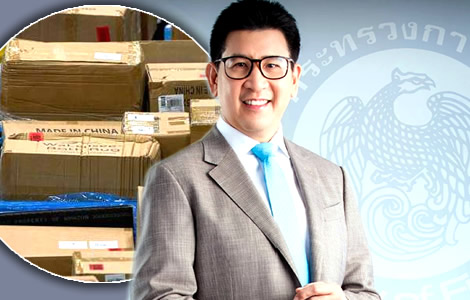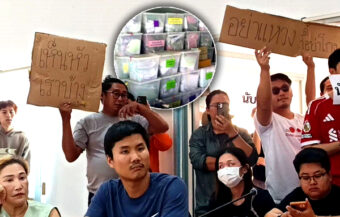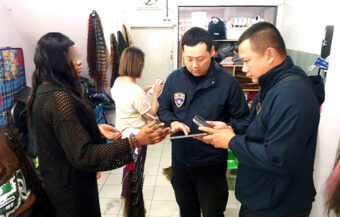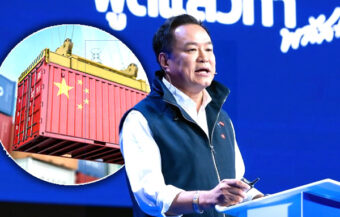Thailand ends the era of cheap Chinese imports as a 10% duty hits parcels under ฿1,500, raising costs, slowing online orders, forcing firms to adapt logistics, and reshaping e-commerce while supporting local manufacturers against surging low-cost goods.
Thailand will impose a 10% duty on small parcels valued at up to ฿1,500. The move mirrors recent U.S. action and similar plans in the European Union. It targets a surge of cheap Chinese imports driven by falling demand in the United States. The policy marks a sharp break from past practice and will reshape the market. Low-priced imports will become more expensive and tied up in a far heavier processing regime. Thai consumers will face higher costs and may be pushed back toward local stores.

Thailand will impose a 10% duty on low-cost imports now exempt from tax. The finance minister, Ekniti Nithanprapas, announced the decision on Friday. The measure starts on 1 January next year.
Current rules exempt goods valued at ฿1,500 or less. Items above that level face varied rates based on product type. The government says the new duty will support Thai small- and medium-sized businesses. It also says it will curb the surge of cheap imports entering the country.
Additionally, Mr Ekniti said the government will seek cooperation from online commercial platforms. These platforms will be asked to help collect the duty. He said the change follows intensified pressure on domestic producers.
Rising cheap imports and new duty rules reshape e-commerce operations and strain logistics
Cheap imported goods have increased during the global trade war. As a result, Thai factories have struggled to keep pace. Officials say the new duty will slow the influx and stabilise conditions for local manufacturers.
Furthermore, law firm Tilleke & Gibbins said the move will reshape the e-commerce sector. It said carriers that handled millions of tax-free parcels will now face duty assessments. These carriers must add new processing steps for low-value shipments.
This will create additional burdens for logistics operators. It will also lengthen processing times for inbound parcels. The firm called the shift a major break from long-standing duty-free treatment for small cross-border orders.
Last year, the previous government approved a 7% VAT on the same category of goods. That VAT applies until December. Domestic businesses say the VAT eased some pressure but did not slow import volumes. They report continued factory closures linked to cheap goods, mainly from China.
Removal of Thailand’s de minimis rule signals a broad shift toward tighter controls on low-value imports
These goods disrupted local production and sales channels. Many firms urged the government to take stronger action.
Meanwhile, Thailand’s Customs Department sees this second move as a wider policy change. It will remove the de minimis exemption on 1 January 2026. This exemption waives duties on parcels valued at ฿1,500 or less.
Its removal means all imports will face duty assessment regardless of value. The department said the aim is fairer competition for Thai SMEs. Local firms must pay VAT and other costs. Foreign sellers avoided some of these charges by using the exemption. The department said the new rules close that gap.
Moreover, the exemption has been central to the cross-border e-commerce model. Millions of small parcels enter Thailand each year without duty. Foreign platforms used this rule to offer low prices. The new duty rules are expected to alter that model significantly. Analysts say the changes will raise prices and extend customs clearance times. They also say some sellers may adjust shipping practices. Consolidated shipments may replace many small parcels.
New duty regime increases costs for cross-border sellers and forces logistical and pricing adjustments
Businesses involved in cross-border trade will face new costs. Foreign e-commerce sellers must adjust pricing structures. They must also manage more complex declarations for every shipment. Higher costs may lead to slower demand for small imported goods. Some buyers may drop purchases when final prices rise. Sellers will need to examine their margins and revise strategies.
Likewise, logistics providers expect heavier administrative loads. They previously cleared most low-value parcels with quick checks. Under the new rules, every parcel requires a duty assessment. Carriers must redesign workflows and recalibrate IT systems.
They will also need clear rules on who will pay the duty. Some carriers charge recipients at delivery. Others collect fees from senders. Each model affects delivery times and staffing needs.
Domestic SMEs and retailers expect improved competitiveness. Many said low-cost foreign goods eroded market share. They said their operating costs made price matching impossible. They argued that duty-free imports worsened closures and job losses. The new duty and the 2026 exemption removal aim to reduce this price divide. Local groups say even small pricing adjustments change buyer decisions.
Lack of detailed customs guidelines forces firms to prepare upgrades and stricter compliance measures
However, the Customs Department has not published detailed guidelines. Businesses are waiting for instructions on assessment methods. They also want clarity on valuation rules and required documentation.
These details will determine processing times at entry points. They will also shape system upgrades inside logistics networks. Companies expect further announcements from the Ministry of Finance.
Additionally, firms are reviewing their harmonised system codes. They must ensure accurate classification for each product. Incorrect HS codes could slow clearance and raise compliance risks. Valuation practices will also require attention. Firms that relied on simplified methods for low-value parcels must revise those approaches. Many have already begun internal audits to prepare for the transition.
Companies are also consulting customs brokers. They want to assess whether brokers can manage the increased workload. Some brokers may need new staff or automated tools. Others may change service fees to offset extra processing. The scale of adjustments will depend on final regulations. Many firms say they will adopt phased changes once guidelines appear.
Platform and government action signal a change in import controls and rising costs across the market
Meanwhile, foreign platforms are recalculating fulfilment strategies. They may shift stock to domestic warehouses. They may also modify delivery routes to reduce customs interactions. These moves could limit delays but raise operating costs. The long-term effect on consumer behaviour remains unclear. Some platforms expect reduced order volumes for low-cost items.
Still, the government frames the duty as a structural policy shift. It signals tighter control over low-value imports. It also indicates a move away from reliance on duty-free e-commerce models. The 2025 duty and the 2026 exemption removal form a combined framework. Both measures aim to equalise cost structures between domestic and foreign sellers.
Trump tariff crisis has exposed the colonisation of the Thai economy by Chinese zero-dollar factories
Thai firms call for urgent and robust action on cheap Chinese imports as manufacturing shrinks
In the coming months, businesses will monitor official announcements. They will also review margins, pricing, and logistics strategies. The shift to universal duty assessment will require extensive operational changes. Firms that prepare early may reduce transitional delays. The new rules will reshape the cross-border market as the deadlines approach.
The upshot, of course, may be higher inflation on goods while local manufacturers may see increased demand. Certainly, the move will impact Thailand’s imports of cheap Chinese-made products. Indeed, successive Thai governments have faced pressure from China not to apply such charges. The move is coming now as part of a worldwide trend initiated by the United States.


















